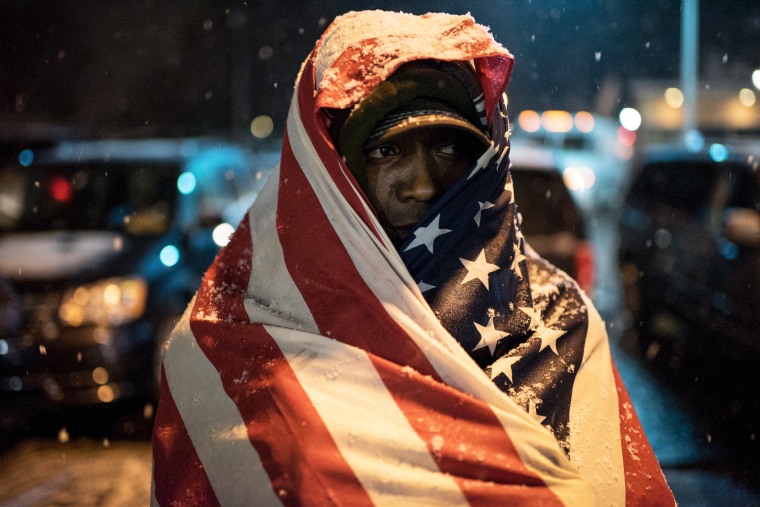The grand jury has made its decision. Darren Wilson is no longer a police officer. The protests, in Ferguson, Missouri, at least, are starting to die down.
But the unrest that has sparked a national conversation on race and policing was never just about Wilson’s fate in the wake of the shooting death of unarmed teen Michael Brown nearly four months ago. It was about a push for concrete steps to address the economic, social and educational issues the teen's death raised.
RELATED: Ferguson Commission meets for first time
And on that front, things are just getting started. A state-level commission appointed by Missouri Gov. Jay Nixon to examine just those issues held its first meeting Monday—the same day that the White House announced several steps forward after President Obama met with activists on the social disparities highlighted by events in Ferguson. Here’s where things stand on some of the key policy moves that are currently on the table in response to the unrest:
Body cameras: If Ferguson police were required to wear body cameras recording their interactions with citizens, as officers in more than 1,000 departments across the country are, there would be a clearer picture of exactly what happened between Wilson and Brown. Better yet, Wilson might not have been as quick to use his weapon. Obama announced Monday he has asked for $263 million for police body cameras and training—a program that would require congressional approval and could help pay for 50,000 of the devices. Missouri lawmakers have also introduced bills to require police to wear such cameras.
Police militarization: Over the summer, this issue briefly looked like one that the left and right could unite around, after police use of military-style vehicles and other equipment against protesters drew widespread criticism. But the White House said Monday that it wouldn’t make significant changes to a federal program that provides military-grade equipment to states and localities, instead focusing on ensuring the equipment is being used properly.
Laura Murphy, the legislative director of the American Civil Liberties Union, said her group would like to see more, including a ban on providing such equipment to local law enforcement entities that are under consent decrees with the Justice Department because of past questionable practices. “I think the president can go further, and we will be lobbying him to go further in next couple weeks,” said Murphy, who attended Monday’s White House meeting.
James Hayes of the Ohio Students Association, another group pressing for changes, said broader changes to policing are needed. “We also need to demilitarize the mindset of our police, not just their equipment,” he said.
RELATED: Obama: 'This time will be different'
Reforming local policing: The White House appears to agree with Hayes. Obama also announced a task force Monday to improve local policing, which will be led by a former Philadelphia Police Department commissioner and a leading criminal justice scholar.
More important, Attorney General Eric Holder said the Justice Department will soon announce new guidelines aimed at “once and for all” eliminating racial profiling—one of the key systematic problems raised by protesters since Brown’s death. The new guidelines have long been in the works, but have been given added momentum by Ferguson.
But exactly how to improve police-community relations remains a bit amorphous, even to those pushing for change. “We need police that are actually attuned with the community,” said Ashley Yates of Millenial Activists United, who attended Monday’s White House meeting. “But exactly what that means has yet to be determined.”
Prosecutorial conflicts of interest: Among the key factors driving the anger of protesters and Brown supporters is the behavior of St. Louis County Prosecutor Bob McCulloch, who some said appeared to be acting as Wilson’s defense attorney during the grand jury proceedings on the case of Brown's death. McCulloch has close family ties to the St. Louis police force, and his office routinely works closely with law enforcement. A Democratic Missouri state senator introduced a bill Monday that aims to avoid such potential conflicts of interest, by requiring that deadly police shootings be investigated by a special prosecutor. A Republican state lawmaker, Rep. Jay Barnes, has said he plans to introduce a similar bill in the legislature. “This sort of change would make sense regardless of what is happening in Ferguson,” Barnes said.
RELATED: Holder to announce DOJ program on racial profiling by police
Traffic offenses: Another big contributor to tensions between law enforcement and the St. Louis area's black citizens: the practice by many small municipalities of raising funds by imposing large fines for minor traffic offenses. Often these fines can lead to jail time if they are not paid promptly. A bill by Missouri lawmakers would reduce the penalties for traffic offenses, and make it harder for such situations to spiral out of control.
Discouraging the use of deadly force: Currently, Missouri police officers can use deadly force when they reasonably believe it is “immediately necessary” to do so. A bill introduced by a Democratic state lawmaker would require that officers first use all other reasonable ways of trying to stop the suspect, such as a taser. Police also would have to issue a warning that deadly force may be used. A separate bill would allow for deadly force only if a suspect poses a clear danger to the officer or others.
